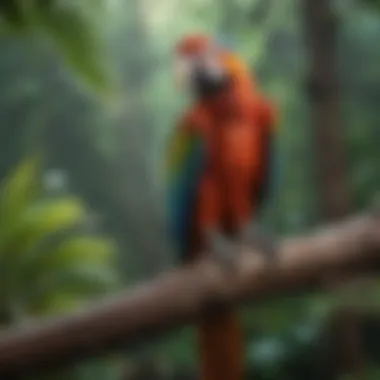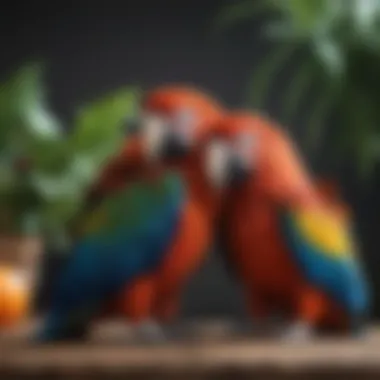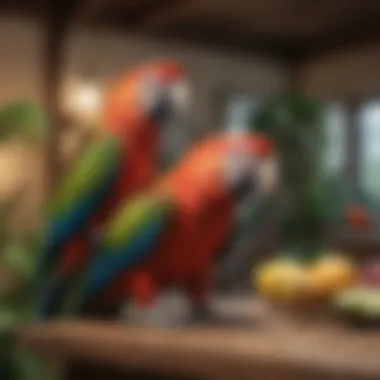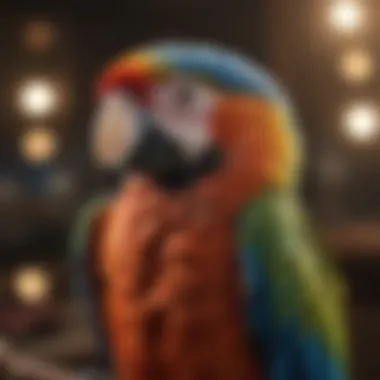Understanding Macaw Bird Prices: A Comprehensive Guide


Intro
Macaws are vibrant and intelligent birds, cherished for their striking plumage and engaging personalities. Owning a macaw comes with exciting opportunities but also challenges. Price is a crucial factor that potential buyers must consider. Understanding how various aspects influence macaw prices will help in making informed decisions. This guide explores the dynamics of macaw pricing, touching on breed, age, and geographical factors. With this knowledge, future macaw owners can better understand their commitment.
Care Tips
Caring for a macaw is a significant responsibility. Their needs are specific and can be demanding. Proper care routines not only ensure the well-being of these birds but can also impact their price.
Daily Care Routines
Daily care for macaws includes feeding, social interaction, and mental stimulation. Establishing a routine helps macaws feel secure. Face-to-face interaction and playtime are crucial components of their daily life. Failing to engage them adequately can lead to behavioral issues, which may diminish their overall value.
Cage Setup and Maintenance
Cage size and setup are critical for macaws. These birds require spacious cages that allow them room to move and play. A good cage enhances their quality of life and is a sign that a potential owner takes macaw care seriously. Regular maintenance of the cage is essential to prevent health issues.
Hygiene and Cleaning Practices
Regular cleaning of the living environment is vital. This includes removing droppings and uneaten food. A clean cage helps minimize the risk of bacterial infections. The overall cleanliness of a macaw’s environment can also affect its market price.
Seasonal Care Adjustments
Macaws may need different care based on seasons. For example, in colder months, extra measures like heating lamps may be necessary. Adjusting care according to seasons shows a responsible and dedicated ownership, which is often reflected in the bird’s value.
Behavioral Insights
Understanding macaw behavior can deepen the bond between bird and owner. Macaws are social creatures and their behavior can reveal their emotional state. Thus, recognizing behavioral cues is essential.
Understanding Bird Body Language
Recognizing body language in macaws aids in determining their moods. For instance, a bird with feathers puffed up may be feeling insecure. Conversely, a relaxed stance indicates comfort. Understanding these signals is essential for bonding and training.
Common Behavioral Issues and Solutions
Macaws can develop behavioral issues like excessive screaming or feather plucking due to stress or lack of interaction. Providing toys and engaging activities can be effective strategies to alleviate such problems. Addressing these issues early can maintain the bird's well-being and value.
Positive Reinforcement Techniques
Using positive reinforcement during training helps macaws learn. Treats or praise can encourage desired behaviors. This method proves effective and fosters trust between owner and bird.
Social Interaction Needs
Macaws are social and thrive on interaction. Long periods of solitude may lead to stress or depression. Adequate social engagement is crucial for their emotional health, contributing positively to their overall value in the market.
Nutrition Guides
Proper nutrition is foundational for the health and longevity of macaws. A well-balanced diet enhances their vitality and reflects the quality of care provided by the owner.
Essential Diet Components
Macaws require a diet rich in fruits, vegetables, nuts, and specially formulated pellets. Fresh water should be provided daily. A well-rounded diet ensures optimal health and can positively influence the price of a macaw.
Safe and Toxic Foods
Some foods are harmful to macaws, such as avocado and chocolate. Being knowledgeable about safe and toxic foods protects them and preserves their value.
Supplements and Treats
In some cases, offering supplements may be necessary. A healthy bird can command a better price and ensure longevity. Occasional treats also help in creating a strong bond between owner and bird.


Feeding Strategies for Different Species
Different macaw species have varied dietary needs. Research into the specific requirements of the macaw species being considered is essential for appropriate care.
Wellness and Health
The health of a macaw determines its quality of life and market price. Regular health checks and preventive measures are paramount.
Routine Health Checkups
Routine checkups with an avian vet are essential. Regular assessments help catch health issues early, thereby maintaining a bird's health and market value.
Identifying Symptoms of Illness
Understanding common illness symptoms, such as changes in appetite or behavior, can lead to timely veterinary intervention. Being proactive about health can enhance perceived value and ownership responsibility.
Preventative Care and Vaccinations
Vaccinations and preventive care significantly reduce the risk of severe illnesses. Investing in a macaw's well-being reflects responsible ownership and can impact price positively.
Mental and Emotional Well-being
Ensuring a macaw’s mental health through activities and social interaction is equally important. A happy bird is generally healthy, which can enhance its value.
Enriching Activities
Macaws need engaging activities to thrive. Providing stimulation is crucial for their development and overall happiness.
Toys and Playtime Ideas
Offering varied toys keeps macaws mentally stimulated. Different textures, colors, and interactive toys can prevent boredom. Engaged birds are less likely to develop behavioral issues.
Training and Tricks
Training sessions can provide mental stimulation. Teaching simple tricks enhances the bond with the owner and keeps the bird active.
Outdoor Activities and Interaction
Supervised outdoor time can enhance their quality of life. Fresh air and sunlight contribute to their well-being, ensuring a healthier and happier bird.
DIY Projects for Mental Stimulation
Creating DIY projects for mental stimulation can be rewarding. Simple tasks can engage macaws and keep them busy, positively affecting their health and behavior.
Responsible ownership practices contribute significantly to the long-term satisfaction of both the bird and its owner. These practices also reflect in the bird's market value, warranting thoughtful consideration before purchase.
Preface to Macaw Birds
Understanding macaw birds is essential for anyone considering them as pets. They are not just colorful and vibrant creatures; they also add a lot of joy and companionship to their owners. Before diving into the intricacies of macaw pricing, it is important to build a foundational knowledge about these birds. This section will cover some key factors that contribute to the macaw's appeal, advantages, and aspects to consider.
What are Macaw Birds?
Macaws are large, long-tailed parrots native to Central and South America. Known for their striking plumage, they are among the most visually impressive birds in the world. Their natural habitat includes tropical rainforests, where they thrive in pairs or small groups. In addition to their beauty, macaws possess high intelligence. This allows them to mimic sounds and engage in complex social interactions.
As a potential bird owner, understanding the characteristics of macaws can help in making informed decisions. These birds require significant socialization and mental stimulation. They live for many decades, with some species reaching up to 60 years or more in captivity. Be prepared for a long-term commitment. Additionally, many macaw species face threats in the wild due to habitat loss and illegal trapping, which amplifies the importance of responsible ownership.
The interaction and bond between macaws and their owners can be incredibly rewarding, but it is critical to recognize the commitment involved in caring for these intelligent beings.
In evaluating the responsibility that comes with owning a macaw, understanding variations in pricing can significantly influence the decision-making process. Factors to consider include different breeds, market demand, and specific needs for their upkeep. Familiarizing oneself with these elements will pave the way for a pleasurable experience in macaw ownership.
Factors Affecting Macaw Bird Prices


Understanding the factors that influence macaw bird prices is essential for anyone considering bringing one of these magnificent creatures into their home. Macaws are not just birds; they are commitment and investment. Various elements come into play when it comes to their pricing, such as breed, age, and even geographic location. Each of these factors can significantly impact the cost and should be considered carefully by potential owners.
Breeds and Their Price Ranges
Different macaw breeds come with their own price tags. For instance, a Hyacinth Macaw, known for its striking blue feathers, can cost anywhere from $8,000 to $15,000. In contrast, a more common breed like the Blue-and-Yellow Macaw might range from $1,500 to $3,000.
The rarity and demand for specific breeds, as well as their uniqueness, play a crucial role in determining prices. Moreover, health, socialization, and the breeder’s reputation can also influence the final price of each macaw bird.
Age and Price Implication
Age is another significant factor that can affect a macaw's price. Young macaws, especially those that are still being hand-fed, tend to be more expensive than fully grown ones. A young macaw requires more expertise in care, while older macaws, though less costly, might have formed specific habits or personality traits that require a different kind of attention. Generally, you could expect to pay anywhere from $1,000 to $4,000 for a baby macaw compared to $800 to $2,500 for an older bird.
Color Mutations and Aesthetic Value
Color mutations in macaws can significantly affect their prices. Macaws come in numerous color variations, and those with rare colors—like the Scarlet Macaw with yellow and red patterns—often command higher prices. Birds with unique mutations or striking appearances can cost significantly more than their standard-colored counterparts.
For example, a Lutino Macaw might attract a price that goes beyond the typical market range, sometimes reaching upwards of $5,000. This is due to the aesthetic value that unique colors offer to collectors or enthusiasts who appreciate the beauty and rarity of these variations.
Supply and Demand Dynamics
The law of supply and demand plays a fundamental role in the pricing of macaw birds. In areas where macaws are less common, prices may surge due to limited availability. Conversely, in regions with a plethora of bird breeders selling macaws, prices might be lower due to increased competition. The demand can also fluctuate based on current trends in pet ownership and aviculture.
"Understanding market demand can save potential buyers money and help them find the right macaw for their needs."
Geographic Location Impact
Geographic location is critical when considering macaw pricing. Prices can vary drastically from one region to another. In urban settings, where specialty shops or licensed breeders are prevalent, prices may be higher due to the costs associated with operating in these areas. Conversely, in rural regions, prices might be lower, reflecting reduced overhead costs.
Additionally, local laws regarding exotic pet ownership can influence availability and pricing. Thus, potential buyers should research their local market thoroughly to understand the financial implications of acquiring a macaw in their particular location.
Initial Costs of Owning a Macaw
Understanding the initial costs of owning a macaw is crucial prior to any decision of purchase. Such a bird is not just a pet; it becomes a companion requiring a significant commitment in both time and money. Without a clear grasp of upfront expenses, prospective owners may find themselves overwhelmed or unprepared in their journey of bird ownership.
Purchase Price Overview
The purchase price of a macaw can vary widely based on several factors. Generally, the cost of a macaw can range from about $1,000 to over $3,000. More exotic or rare breeds, like the Hyacinth Macaw, may even exceed this, touching values of $10,000 or more.
When considering the price, one must ask whether to buy from a breeder or an adoption agency. Ethical breeders often charge more due to responsible practices, health guarantees, and better living conditions for the birds. Additionally, the age and health of the bird influence the price. A younger macaw may be more costly than an older one but often comes with the opportunity for more training and bonding.
Essential Supplies and Setup Costs
Beyond the purchase price, various essential supplies and setup costs must also be factored in. Before bringing a macaw home, preparing an environment that supports their physical and mental health is vital.
Key items include:
- Cage: A large and sturdy cage is necessary for the macaw’s safety and comfort. Depending on the size and quality, cages can range from $300 to $1,200.
- Food and Water Bowls: Having the right feeding setup is important. These bowls can cost around $20 to $50.
- Perches and Toys: Macaws need toys and perches appropriate for their size and activity level. Costs can accumulate to $100 to $400 depending on quality and quantity.
- Bedding Material: Proper bedding is essential for cleanliness. Budget around $50 annually for this.
Veterinary Costs and Health Considerations
Veterinary care is another significant part of the initial costs. A new owner should conduct a thorough health checkup shortly after acquisition. This typically costs between $100 to $300. Additionally, macaws may require regular checkups, which can add up over time.
Preventive care is crucial to avoid future expenses that may arise due to illness. Vaccinations and health screenings, alongside possible emergencies, can lead to a budget between $200 to $500 annually. Always consider acquiring pet insurance for birds, as it can provide additional financial protection against unforeseen medical costs.
Investing in your macaw's health and environment during the initial setup not only enhances their quality of life but is also a reflection of the responsible ownership that potential macaw owners should strive for.
Long-term Financial Commitment
When delving into the realm of macaw ownership, an often understated aspect is the long-term financial commitment associated with these birds. Owning a macaw extends beyond the initial purchase price, requiring constant investment for the bird's well-being. This not only highlights the importance of financial planning but also underscores the emotional and ethical responsibilities inherent in this choice.


It's crucial to recognize that macaws can live for several decades, often reaching ages of 50 years or more. Thus, prospective owners must consider not just their current financial status but also their future stability. The commitment involves understanding direct costs like food, housing, and healthcare, alongside indirect costs such as potential lifestyle adjustments to ensure the pet's well-being.
Ongoing Care Expenses
Ongoing care expenses form a significant part of the financial commitment. Regular expenses include
- High-Quality Diet: Macaws require a balanced diet that typically consists of high-quality pellets, fruits, and vegetables. A healthy diet can be costly, often amounting to $60-$100 per month or more, depending on the dietary preferences.
- Bedding and Cage Maintenance: Regular maintenance of the cage and bedding materials also incurs costs. Quality bedding must be changed frequently to ensure cleanliness and sanitation, adding an extra $20-$40 monthly.
- Regular Veterinary Care: Routine check-ups and vaccinations are essential. Veterinary bills can escalate quickly, averaging around $100-$300 per visit, not to mention any specialized care that might be needed.
- Toys and Enrichment: Macaws require mental stimulation. Purchasing toys and other forms of enrichment can range from $10 to $100 monthly.
Overall, ongoing care expenses can total $500 or more annually, depending on individual circumstances and the macaw’s specific needs.
Potential Unexpected Costs
Beyond routine expenses, potential unexpected costs can strain any financial plan. Some examples include
- Emergency Veterinary Visits: Accidents happen. The unexpected need for emergency care can easily reach $1,000 or more, depending on the severity and nature of the issue.
- Health Problems: Chronic health issues may arise, leading to ongoing treatment costs that can be significant. For example, certain conditions might require regular medication or therapy, adding hundreds to an annual budget.
- Cage Replacement or Repair: Over time, wear and tear can impact essential items like cages. Depending on the damage, replacement or substantial repairs may be necessary, costing hundreds of dollars.
Ethical Considerations in Purchasing Macaws
When considering the purchase of a macaw, one must confront the ethical implications intertwined with this endeavor. Macaws are not just pets; they are intelligent, lively beings that require attention, care, and ethical breeding practices. Understanding these elements is crucial for potential owners who want to ensure that their decision contributes positively to the wellbeing of both the birds and the broader avian community.
One significant aspect to address is responsible breeder practices. Not all breeders uphold the same standards when it comes to health and care. Responsible breeders prioritize the health of their birds over profit, conducting health screenings and providing proper socialization. This ensures that the offspring are not only healthy but also well-adjusted to life as a pet. Thus, ethical breeders can also positively impact price, as their thorough practices may lead to higher upfront costs but result in lower health expenses over time.
Another consideration involves the choice between buying a macaw or adopting one. The impact of adoption versus purchasing is profound for both birds and future owners. Many macaws in shelters are in need of homes due to various circumstances, including neglect or abandonment. Choosing to adopt can save a life and provide a macaw with a loving family. Additionally, adopting a bird typically comes with lower related costs compared to purchasing from a breeder. However, potential owners should be aware that some adopted macaws may come with behavioral issues that need addressing, which can require time, patience, and financial commitment.
In summary, ethical considerations in purchasing macaws encompass understanding breeder practices and evaluating the impact of adoption. Making informed choices helps ensure a responsible transition into macaw ownership, fostering a better environment for these birds.
Common Questions About Macaw Prices
Understanding the nuances of macaw bird pricing is crucial for anyone considering adding one of these vibrant creatures to their home. This section aims to address common questions around macaw prices, focusing on the fundamental elements that contribute to their cost. By providing clarity on these questions, potential owners can make more informed decisions regarding their future pets, setting realistic expectations for both the purchase and ongoing care.
What Makes a Macaw Expensive?
The price of a macaw can vary widely based on several factors. One of the most significant elements is the breed of the bird. Certain species, such as the Hyacinth Macaw, tend to be on the higher end of the price spectrum due to their rarity and beauty. Conversely, more common breeds like the Blue-and-Yellow Macaw may come with a lower price tag.
Another key factor is the age of the macaw. Juvenile birds often cost less than mature adults. Although younger birds may be less expensive, they require considerable time and attention to socialize properly.
Additionally, color mutations can influence pricing. Unique color variations tend to attract higher prices, as they are sought after by collectors and enthusiasts. Beyond these physical traits, the cost of a macaw may reflect geographic location and breeder reputation. Birds sourced from reputable breeders who prioritize health, genetic quality, and ethical practices often command a higher price. Also, availability in local markets influences costs.
A well-known quote highlights this aspect of ownership:
"Owning a macaw is not just a financial investment; it's a responsibility that comes with rich rewards."
How to Budget for a Macaw
Budgeting for a macaw goes beyond the initial purchase price. First, consider the setup costs. This includes purchasing a large, suitable cage and other essential supplies like food, toys, and perches. Once the initial setup is handled, one must plan for ongoing monthly expenses which include specialized bird food and routine veterinary care.
Here are some budgeting considerations:
- Initial costs: Purchase price, cage, and supplies can sum up to a significant amount.
- Monthly expenses: Bird food, toys, and routine care should be accounted for.
- Emergency vet visits: Always set aside an emergency fund for unexpected health issues.
Allocating funds wisely can ensure that you provide a stable and enriching environment. Understanding these financial commitments helps prospective macaw owners make prudent decisions that contribute to the well-being of their future pet.
End
The conclusion serves as a vital element in the overarching narrative of this guide. It synthesizes the various aspects of macaw bird pricing we have explored, reinforcing the knowledge necessary for prospective owners. By understanding these factors, buyers can make more informed decisions that align with their needs and financial capabilities.
A thorough consideration of price variations due to breed, age, and geographic factors allows potential pet parents to prepare adequately for ownership. The importance of ethical practices in breeding and the decision to adopt versus purchase cannot be overstated; they shape not only the market but also the lives of these magnificent creatures.
Final Thoughts on Macaw Bird Pricing
Macaw birds, known for their vibrant plumage and intelligent behaviors, can vary greatly in price. Factors such as color mutations and breeder reputation contribute directly to this variability. For instance, rarer color mutations often demand higher prices, while well-regarded breeders may charge premiums due to their commitment to quality and health.
When budgeting for a macaw, it is critical to consider not just the initial purchase price, but also the ongoing costs associated with care. This includes food, veterinary care, and enrichment to ensure a happy, healthy bird.
In essence, understanding the financial commitment of macaw ownership enhances the overall experience, allowing individuals to provide the best possible environment for their feathered companions.
As you navigate this journey, always remember the significance of responsible practices and the impact your decisions hold for both you and the macaw. Doing thorough research will equip you with the insights necessary to foster a rewarding relationship with your new pet.















